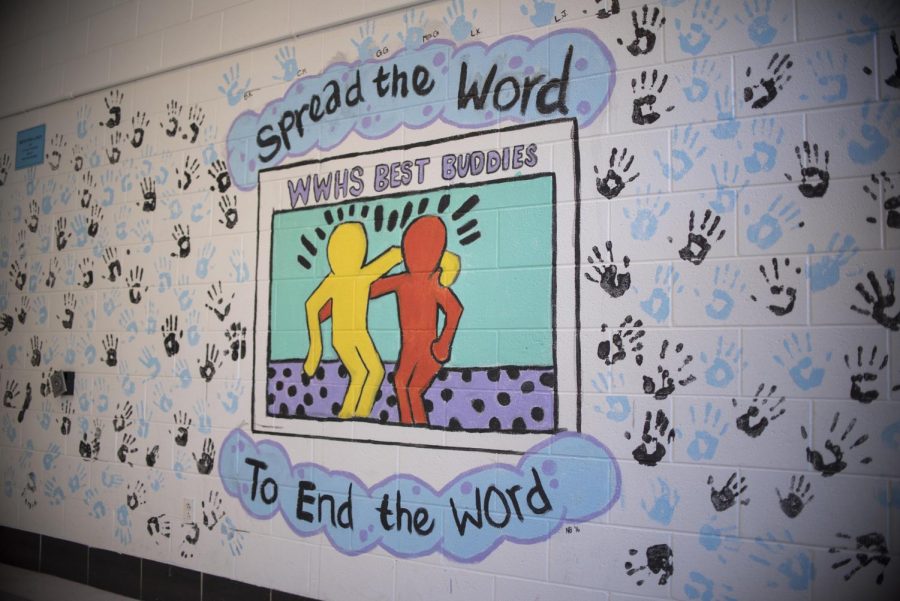Why we should never use the R-word
A mural sponsored by Best Buddies featuring hand-prints of those who donated to the club and pledged to end the use of the R-word. Every March, Best Buddies participates in Special Olympic’s “Spread the Word to End the Word” month to end the everyday use of the R-word. Photo by Annabelle Gordon.
February 16, 2018
“That’s so ret-”
Don’t say it. The R-word, “retard(ed),” is a derogatory, outdated term once used by medical professionals and the general public to describe people with intellectual or developmental disabilities. Today, the R-word has no medical meaning.
What was once coined as a medical term morphed into a synonym for stupid, and now the R-word wrongfully and offensively conflates disability with stupidity.
We need to stop using to R-word, or standing by as others use it, to end the societal alienation of those with intellectual or developmental disabilities and work towards one cohesive community free of hatred.
I learned the true harm of the R-word when I joined Best Buddies at the beginning of sophomore year. In the club, it’s stressed that it’s never acceptable to use the R-word, even in a non-derogatory sense, due to its negative and demeaning connotation.
As a Designated Hitter, I work closely with students with IDD and help them complete their tasks for the period. I’ve gotten to see first-hand how students with IDD understand and process what they’re taught, which has shown me how the R-word is not only offensive but grossly inaccurate. These students aren’t stupid, and they are so much more than their disabilities. When I work with these students, many of whom are now my friends, they employ the same fundamental skills—learning, listening, participating, note-taking and countless others—that students in any other class would.
Despite my involvement in Best Buddies and the DH program, I’ve been in too many situations where I’ve heard adults, peers and close friends use the word to describe someone or their actions as stupid. To these individuals and many others worldwide, the R-word has become a regular part of a collective vocabulary, making its usage seem inconsequential and harmless.
People often ignore that the students within these classrooms and people with IDD across the world deserve to be treated equally. Using the R-word in social settings perpetuates the idea that people with developmental difficulties have less value to our society. Conflating stupidity and developmental disorders dismisses both the personal and intellectual merits of people with these disorders, and thus inaccurately degrades their human worth. When anyone uses the R-word, this community and its advocates understand the ulterior meaning and sense the hatred behind the word.
Since 2009, the Special Olympics has dubbed March “Spread the Word to End the Word” month. The month—with the mission of ending the everyday use of the R-word—is aimed at promoting inclusion and appreciation for community contributions by people with IDD.
In honor of the month for disability inclusion and of respect for others, we should all strive to phase the R-word out of our vocabulary and consider its implications. The time to end the common use of the word is now—my friends deserve better than this. It’s insulting to think that someone would ever say a word so hateful against some of the best people I know.
It really is time to “spread the word to end the word.” If we all stand together—united as one community—we can work together to end the common use of the R-word.








David Rice • Mar 23, 2018 at 12:41 pm
As a Disability Program Manager, I am so proud of the Whitman Community! Way to go!